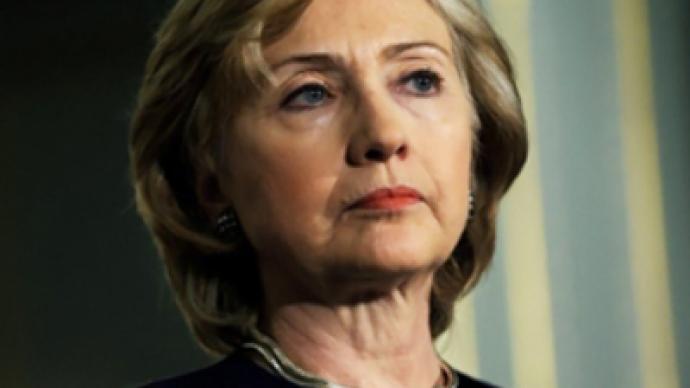Hillary Clinton brings US peace tour to Moscow

With the wind of her commander-in-chief’s controversial Nobel Peace Prize to inflate her sails, U.S. Secretary of State Hillary Clinton arrives in the Russian capital on Monday for talks.
Saturday, things got off to a promising start for Clinton in Zurich, Switzerland where she witnessed the signing of a historic agreement between Armenia and Turkey to normalize their relations after a century of antagonism.
Although the accord will give the Americans some political momentum before Clinton meets with Russian President Dmitry Medvedev for talks on Tuesday, it won’t make it any easier for political observers to swallow the news that US President Barack Obama was awarded the Nobel Peace Prize – a victory that pundits are deriding as “promise over achievement,” or presented for the simple fact that "Barack Obama is not George W. Bush.”
Although a promising gesture, Obama smashing the Bush administration’s dreams of a missile defense architecture in Poland and the Czech Republic could not have been grounds for awarding the U.S. president – who has been in office just 9 months – the Nobel laureate.
Indeed, although the missile defense shield was shelved due to a “reassessment of the Iranian threat,” the United States still has plans to arm Poland with other military goodies, including Patriot missiles batteries.
The U.S.-Poland Patriot agreement, signed in August, promises “the deployment of a U.S. Army Patriot air and missile defense battery in Poland… with the aim of establishing by 2012 a garrison to support the U.S. Army Patriot battery.”
Moscow, which has remained outwardly calm on the idea of Patriot missiles based in Poland, is nevertheless following developments in Eastern Europe with tremendous interest.
(It is important to note that Joe Biden, the gaffe-prone U.S. Vice President who commented in July – shortly after Obama’s successful Russian visit – that Russia is “clinging to something in the past that is not sustainable,” will be paying a visit to Poland, Romania and the Czech Republic from Oct. 20-24, a tour that will certainly touch upon the question of plans for America’s new and improved missile shield).
Russian Foreign Minister Sergey Lavrov said Moscow was eager to hear more about the progress that has been made with regard to “strategic offensive weapons and missile defense.”
“We will be discussing numerous issues concerning international politics and certainly the way our partners have behaved on former Soviet territory,” Lavrov told Interfax on Friday. “We would like their actions to be transparent and above all we would like them to take into account the interests of the countries involved as well as Russia’s legitimate interests.”
But there is presently a far more menacing battlefront for Russia, and it does not involve American military machinations.
Russia’s Afghan Dilemma
Another subject that promises a big portion of the plate involves Afghanistan, a country that Russia knows only too well. America is also starting to feel the pain from this diehard Central Asian country, affectionately dubbed ‘the graveyard of empires.’
Presently, the United States is fielding around 68,000 troops in Afghanistan, a number that America’s military leaders say is insufficient to rout both the Taliban and al-Qaeda forces. Meanwhile, the 42 nations that make up the Coalition forces in Afghanistan are showing signs of wear and tear. The UK, for example, America's most reliable ally with 9,000 troops stationed in the country, last week rejected U.S. calls for a troop increase.
In fact, things are looking so worrying that General Stanley McChrystal, the top military commander in Afghanistan, said in a confidential report that if additional troops were not provided within the next year, the conflict will likely “result in failure” for Coalition forces.
McChrystal is looking for a commitment from Washington for up to 40,000 additional troops, on top of 17,000 already approved in February. McChrystal may have to settle for far less as big chunks of Main Street, U.S.A. are beginning to criticize the war effort.
A recent poll suggests that just 38 percent of Americans are in favor of sending more troops into Taliban country.
“Failure to gain the initiative and reverse insurgent momentum in the near term… risks an outcome where defeating the insurgency is no longer possible,” the general wrote.
McChrystal went so far as to warn that Afghanistan would devolve into “Chaos-istan” unless things change fast.
Although Moscow must certainly be concerned about the haphazard execution of military operations in Afghanistan, which seem to be only infuriating the local population, their real concern touches much closer to home.
Viktor Ivanov, the head of Russia’s Federal Drug Control Service, told the Nixon Center in Washington last month that the clue to “solving the problem of Afghanistan lies in the hands of the United States.”
But Ivanov was speaking about narcotics, specifically heroin, the deadly byproduct of opium, of which Afghanistan exports 93 percent of the world’s total amount. Unfortunately for Russia, and its dire demographic situation, much of that heroin is finding its way to Russian streets, killing “up to 30,000 people annually,” he said.
“We must acknowledge,” Ivanov said, “that the instability and military confrontation of the last eight years created in the long-suffering Afghanistan perfect conditions for the rise of a global Narco-State, which is alone producing more opiates than the whole world did ten years ago.”
“It is symptomatic that according to UN date, the harvest of the opium poppy increased almost fortyfold in Afghanistan since US and NATO troops entered that country in 2001 beginning the US military operation ‘Enduring Freedom.’”
Russia has been pushing for the United States to initiate an aerial defoliation program to combat the explosive growth of poppy fields, yet U.S. officials continually balk on the idea, saying such a mission could be misinterpreted by the Afghan peasants on the ground.
"On the surface, I would say yes, it is an effective way of eradicating the opium," says Timothy A. Jones, the Drug Enforcement Administration's Attache at the US embassy in Moscow. "A lot of these people don't understand the concept of aerial spraying… the people on the ground may think you are attacking everything, destroying their livelihood."
Whatever the reasons for blocking such a seemingly sound strategy, Russia will certainly be looking for some concessions from their American partners, especially when it is considered that U.S. forces are presently using Russian airspace for the delivery of non-military and military supplies into the war-torn nation.
“Russia is the main victim of Afghan heroin,” reminded Ivanov in Washington. “However, it is helping the United States and NATO by making concessions. It allowed transit of not only non-lethal, but also military Afghanistan-bound cargoes across its territory, which is viewed as considerable support to the Coalition’s activities in Afghanistan.”
It seems that Hillary Clinton will have to be prepared to explain how the United States intends to win not only the war for Afghanistan, but the war on drugs there as well.
Iran, Iran so far away
Finally, there is the increasingly ugly question of how to confront Iran’s nuclear ambitions.
Iran says that it is developing its nuclear program for peaceful purposes only; others, notably the United States and Israel, argue that the nuclear energy program is really a front for developing nuclear weapons.
This issue is reaching the critical stage, as Israel, which is frequently the object of Iranian President Mahmoud Ahmadinejad’s heated tirades, is hinting in no uncertain terms that time is running out to deal with what it considers to be an issue of national emergency.
The Times of England recently quoted Ephraim Sneh, a former Israeli deputy defense minister, who warned that Israel may be forced to act alone against Iran.
“If no crippling sanctions are introduced by Christmas, Israel will strike,” he said. “If we are left alone, we will act alone.”
The nuclear stakes increased last week when Iran revealed that it had a uranium enrichment site near the holy city of Qom.
Russian President Dmitry Medvedev hinted that Russia, which has agreed to dispose of Iran's spent uranium rods, may support new sanctions against Iran if Tehran refuses to cooperate with UN inspections, which have been promised full access to the site.
Clinton, who will wrap up her 5-nation whirlwind tour in Russia, will be looking for Moscow’s support in order to apply a full-court press on Iran. Given this atmosphere of mutual assistance, there is every reason to believe that Clinton’s Moscow visit could garner a new level in US-Russian relations.
Now we must hold out hope that Joe Biden, who has a habit of mishandling the reset button, will not undo all of Hillary’s European labors.













